What Parents Get WRONG About Child Depression
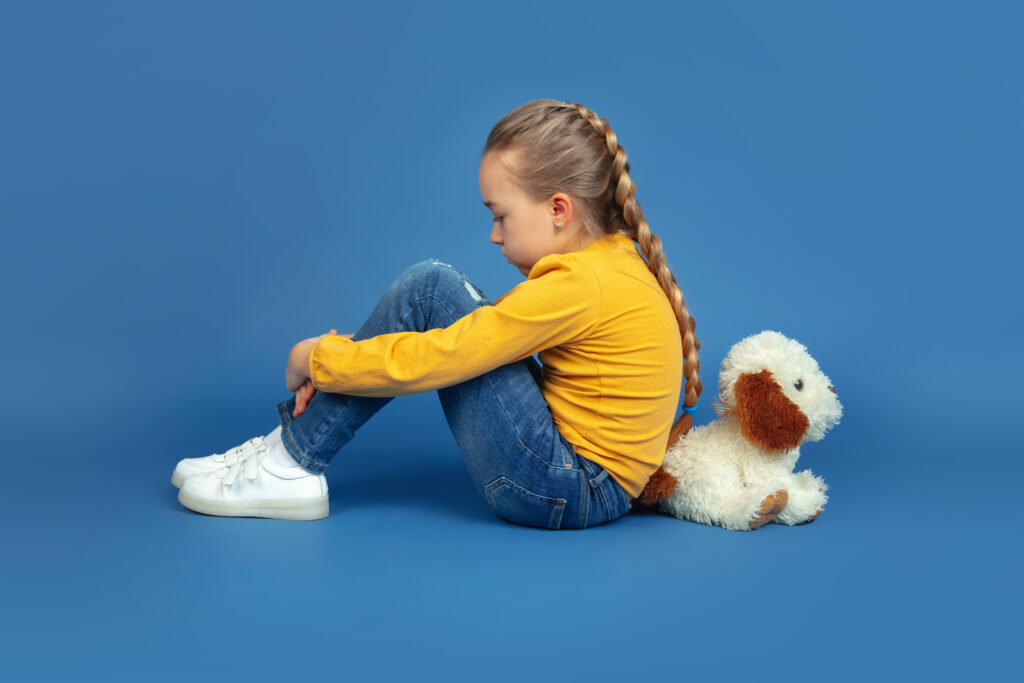
This is a disclaimer that this article is for informative purposes only. It is not intended to diagnose or treat any condition. Please reach out to a qualified healthcare provider or mental health professional if you or someone you know is struggling.
When you hear the word “childhood”, do your thoughts get overflowing with pictures of colorful chalk drawings on the pavement, the sound of children yelling “You’re it!” and the smell of a fresh lemonade being sold on a lemonade stand? Those beautiful years should be the ones when we feel safe, carefree, curious and the happiest, but unfortunately, for some children the dark force that we call depression finds its way to steal their time of innocence.
In those hard times, children need their parents the most to help them get through. They need their support, love, and to be told that everything will be okay. But sometimes, those two most important people can actually make it even harder for kids to deal with depression.
Whether it be because they don’t understand, or because they’re in denial, or simply because they feel like their kids’ depression makes them seem like bad parents, oftentimes their heads get filled with misconceptions about child depression. Since their support is crucial for their children’s recovery, identifying the false beliefs and spreading the message is an important step to help those kids get the childhood they need.
In this article you can find out what parents sometimes think about child depression, and why they got it all wrong.
1. “Childen can’t get depressed, it’s an adult illness!”
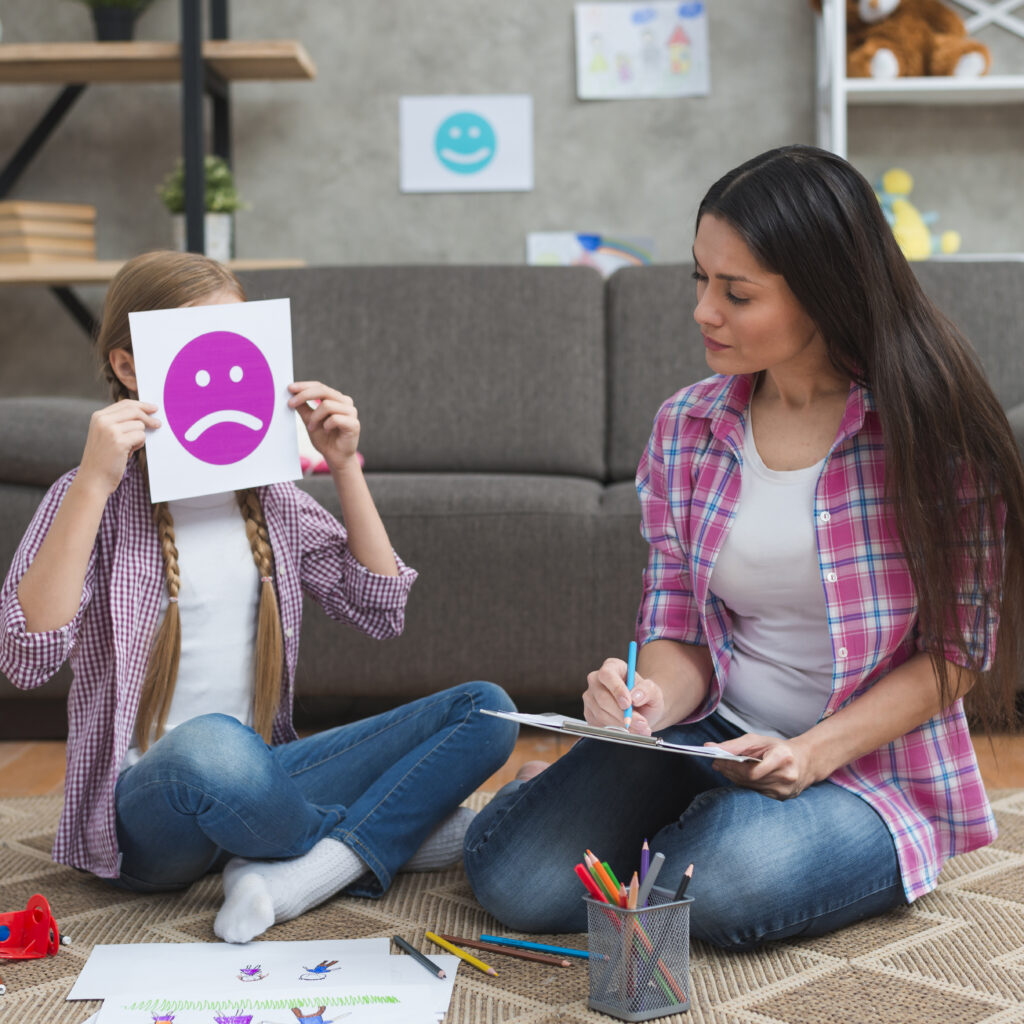
When you think about it, it makes little sense for a child to be depressed. Not only is their life experience not even closely rich enough to be able to see all the bad things life has to offer sometimes, but they also seemingly don’t have a care in the world. They don’t need to worry about finances, politics, chores… All they need to do is study and play. There’s no reason for them to get depressed, right?
Well, no. According to data from the 2019 National Survey of Children’s Health, 22% of the children tested had some sort of an emotional problem (out of 20 000 children in the sample, that is more than 6600 children suffering!). And the worst thing is, the youngest children that participated in the survey were only 3 years old. Heartbreaking, isn’t it?
But how is that possible? To understand it, you have to know that depression isn’t something you can get only when worries of a big, adult life get to you. Your environment can play a big role, of course, but as with everything psychological, it all really starts in the brain. Research has shown that depressed children’s brains show greater reaction to stress hormones, just like depressed adult’s brains do. “Happy chemicals” serotonin and dopamine also play their roles. And for biology, there are no age requirements.
Also, everyone experiences things in their own way. You may think a little teasing in school or a bad grade are not a big deal, but for the little ones whose identities are being developed through relationships with their peers and their academic achievement, stuff like that can leave a pretty big impact. Just as they don’t quite understand our adult worries, we may not be so good at understanding theirs, too.
So, even though we all know that depression shouldn’t be a children’s illness, unfortunately, it can be.
2. “It’s just a phase, it will go away on its own.”
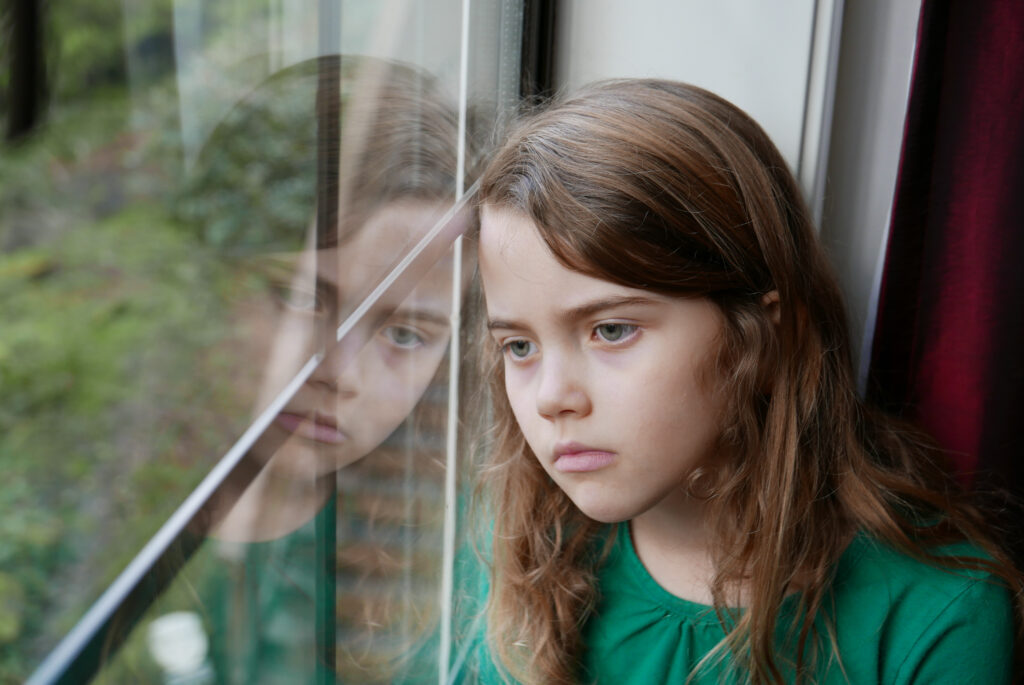
Did you have some child-like phase while growing up? Maybe you were obsessed with a certain toy or a cartoon character or you refused to wear anything that wasn’t in one specific color?
It is not uncommon for kids to go through some kind of a phase, but depression is not one of those. Sure, they may be grumpy and sad for a few days if they don’t get their ice cream from the store, but feeling sad for no apparent reason for a longer period of time is actually a clear sign of clinical depression. Leaving it untreated and waiting for it to go away on its own can actually be quite dangerous.
In many cases adult depression has its roots in childhood, and as the time goes by from childhood, through adolescence, until adulthood, it can get more severe. A recent study published in May in the Journal of the American Academy of Child and Adolescent Psychiatry showed that childhood depression can lead to all kinds of problems in later life: higher levels of adult anxiety, drug addictions, criminal behavior and overall worse health and social functioning. Untreated depression can also bring relationship problems in adulthood, academic decline and failure, and increase risk of suicidal thoughts and behaviors.
As with physical illnesses – depression is an illness, and it needs to be treated properly. There is nothing wrong or shameful about it. Would you wait for a child’s broken bone to heal on its own? If not, don’t wait for their broken soul to heal without help, as well.
3. “It’s because of that darn phone!”

In today’s time, no matter if your generation went through the technology boom or not, you’ve either heard this phrase, or have said it yourself. A kid has a sore throat? Must be that darn phone. A kid is hungry? Must be that darn phone. A kid is depressed?… Is it that darn phone?
It could be, but it is not as simple as it seems. According to a recent paper published by researchers at the University of North Carolina, there is a slight connection between phone usage and depression in teens and younger children, but the causes and effects are not clear. What that means is that even if researchers find higher depression levels with kids who use their phones more often, it is not the phone itself that actually causes depression. Instead, some other variables that are connected with phone time might play that role.
For example, it has been found that kids’ online risks mirror offline risks. If a kid is being bullied at school, they are at higher risk of getting cyberbullied (which could lead to depressive symptoms). If a kid has some emotional problems in general, they are more likely to seek negative content online. Also, social media could make them compare themselves to their peers and make them feel lonely and isolated.
The point is – their phones might increase the symptoms, but most likely it would be because of some existing problems that a child is facing in the real world. If the feel generally happy and content, just being on their phones will not suddenly make them depressed.
What parents could do if they fear their kids’ phones are bad for them is to encourage quality family time without the screen. Family picnic, a trip to the movies, a pizza night… So they know they can have fun with their loved ones and rest their eyes from the blue light!
4. “It’s not depression, they are just lazy!”
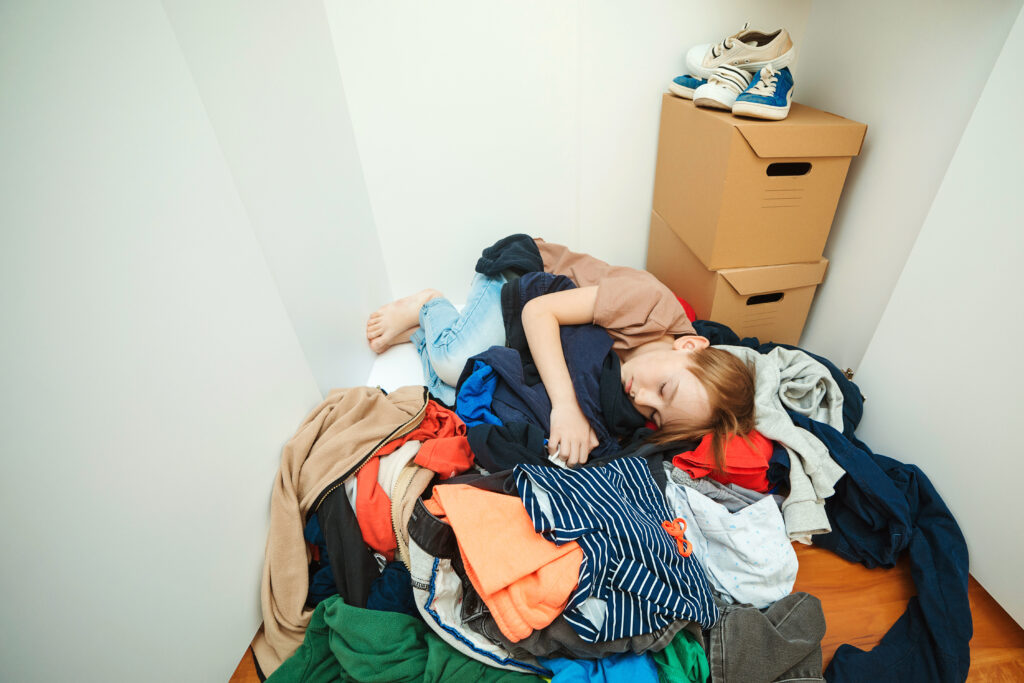
Depression often likes to wear a mask and disguise itself as laziness. When that happens, a suffering child gets a free ticket for depression’s carnival – a ride in a messy room, unkempt hair booth, dirty clothes rollercoaster. It gets easy for their parents to ignore looking beneath the surface and call their child lazy, but inside their kid’s depressed brain there are actually mechanisms that keep them appear lazy.
To explain this, let’s take another look inside the brain. Our thoughts, emotions and motivation are regulated by a set of chemicals that operate inside our heads, and for normal functioning, those chemicals need to be at a certain level. When those levels get messed up, that gets in the way of the brain working properly and efficiently – it makes the brain slower and lacking in energy.
Try to remember that time when you had an especially busy day. You came home and all you wanted to do was to lay down and rest your body, and you felt like even taking a shower was too big of a task. When a mind is depressed, the body feels like that most of the time. Fatigue, slow movements, persistent lack of energy or difficulty doing simple tasks are just a few of the many physical symptoms that go hand in hand with depression. This makes it very hard to get out of bed and be active.
So when a child is having trouble cleaning their room, helping with chores or even hanging out with friends, the problem often goes way beyond simple laziness. And they probably know they seem lazy, they wish they could just get up and move, but their brains are working against them.
With all that being said, if you have a kid who shows some of these signs, don’t get mad and yell at them calling them lazy. Instead, ask them if they feel it is hard for them to get around. Tell them you are here for them if they need help, and that you love them no matter what.
5. “If I take my child to therapy, they will just get stuffed with medicine.”
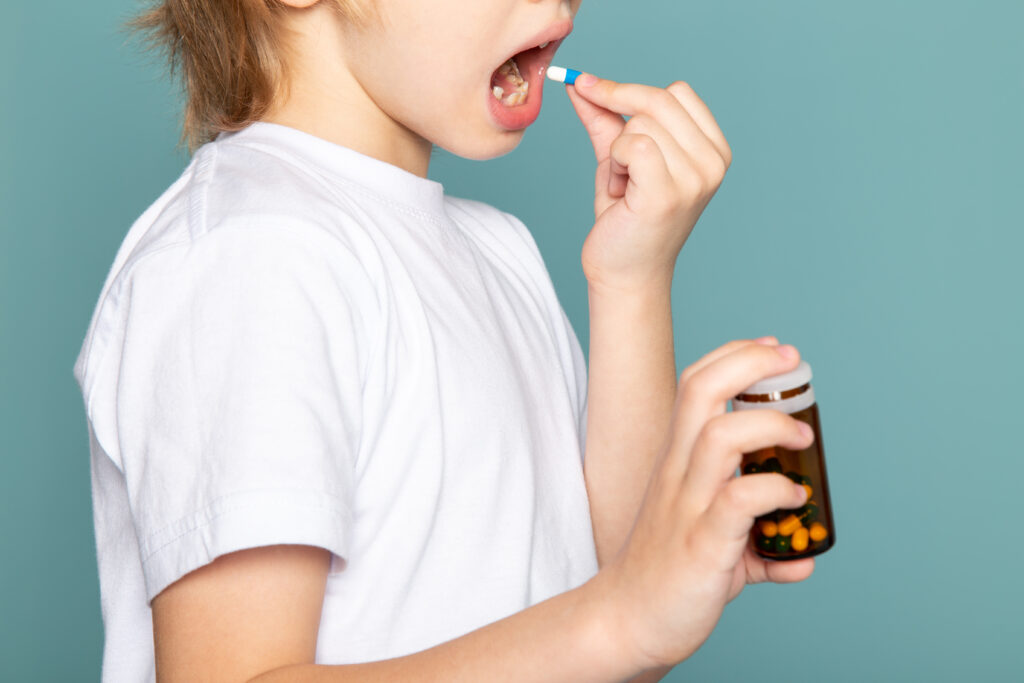
The truth is, child psychiatrists will usually give it a long thought before they prescribe medication to children. Most of the time treatment consists of visits to a psychologist which include different kinds of therapy, with the most popular and most effective being cognitive-behavioral therapy (CBT).
CBT uses methods that simultaneously help to improve a child’s thoughts and behavior. It is very effective in increasing coping skills, improving communication skills and peer relationships, solving problems, combating negative thinking patterns, and regulating emotions.
A study published in European Psychiatry journal reviewed the efficiency of CBT for child depression and found that at the end of treatment, CBT resulted in 63% less risk of depressive symptoms reappearing again at follow-ups.
But for severe cases of depression, sometimes medication is necessary. When deciding on medicating a child, there are precautions that psychiatrists make: treatment should correspond to the level of depression, patient preferences (which includes the parents if the patient is a child), the developmental level of the child, risk factors, and availability of other possible means of treatment. Also, the child is given the lowest possible dose of medicine, and the whole process is closely monitored by professionals.
Just remember: as a parent, you will always be informed and educated on treatment methods and you would be included in the final decision. The important thing is to take professional’s advice seriously and really consider all possibilities.
6. “If my kid is depressed, it means I’m a bad parent.”
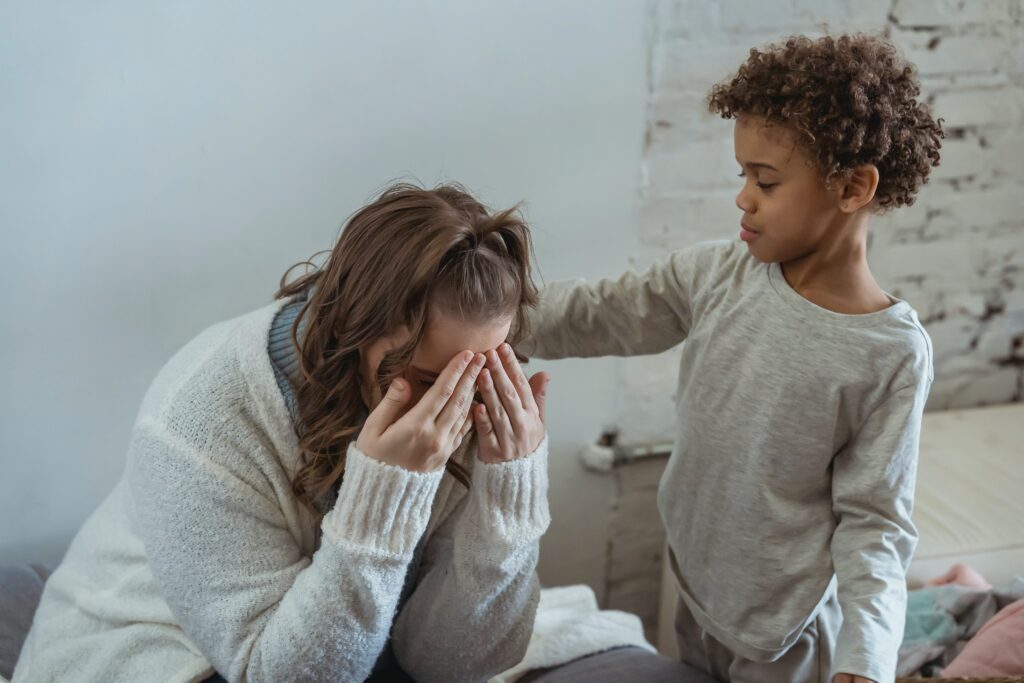
In some cases, parents actually can affect their kids’ mental health, but those cases are really the extremes. Those situations include: a child being a victim of violence, abuse or neglect at home, witnessing violent acts in their home or community, a family member attempting or committing suicide, having parents who are separated/divorced, or having parents who use authoritarian parenting style (lots of rules and little warmth).
But if none of this applies to your parenting, if you are trying hard to be a good parent and make your child happy, does it mean you are a bad parent if your kid has depression? Of course not.
As we mentioned throughout the article, there are lots of reasons why a person could develop depression, especially the biological ones. You cannot be responsible for your kid’s brain chemistry.
What’s important is that you are really trying to understand your childrens’ struggles, you’d do anything in your power to help them and you are doing your best even though you may not know how. And that’s what makes you a good parent.

Hopefully, you’re just a reader interested in this topic. But if you’ve read this article because you’re a parent and you suspect (or know) your child is depressed, I’m truly sorry your family is going through this. And I want you to know that it can, and will, get better.
Keep reading and learning about child depression so you can at least try to understand it, let your child know you have their back, and try to find a good therapist who will give your kid and your family much needed help. Be here for your child, and never lose hope!
Thank you for reading!
Written by: Stela Košić
If you wish to find out more about topics on child mental health, feel free to check out some of the videos from Psych2Go’s YouTube channel:
- 8 Signs Your Child is Depressed (For Parents)
- 7 Signs of Depression Caused By Your Childhood
- How Your Childhood Affects Your Mental Health
- 7 Signs of Anxiety Caused by Your Childhood
- 5 Ways to Talk about Depression with Your Parents
Refer to this list for studies mentioned and used in writing this article:
- Child Mind Institute. (2021, August 16). Treatment for Depression. https://childmind.org/article/treatment-for-depression/
- Clark, M.S., Jansen, K.L. & Cloy, J.A. (2012). Treatment of childhood and adolescent depression. American Family Physician, 86(5), 442-8.
- Depression in Children: Symptoms, Suicide Signs & Treatment. (2020). Cleveland Clinic. https://my.clevelandclinic.org/health/diseases/14938-depression-in-children
- INTEGRIS Health. (2021). How Parents Affect Their Child’s Mental Health. https://integrisok.com/resources/on-your-health/2021/may/how-parents-affect-their-child-mental-health
- Kong, F., Liu, G., Gao, Q., & Deng, J. (2021). From early to late adolescence: Effect of problematic mobile phone use on depression of adolescents. School Psychology International, 014303432110392. https://doi.org/10.1177/01430343211039266
- Kraus, C., Castrén, E., Kasper, S. & Lanzenberger, R. (2017). Serotonin and neuroplasticity – Links between molecular, functional and structural pathophysiology in depression. Neuroscience and Biobehavioral Reviews, 77, 317-326. doi: 10.1016/j.neubiorev.2017.03.007.
- Luby, J.L., Heffelfinger, A., Mrakotsky, C., Brown, K., Hessler, M. & Spitznagel, E. (2003). Alterations in stress cortisol reactivity in depressed preschoolers relative to psychiatric and no-disorder comparison groups. Archives of General Psychiatry, 60(12), 1248-55. doi: 10.1001/archpsyc.60.12.1248.
- NSCH 2019: Children with mental, emotional, developmental or behavioral problems, Nationwide. (2019). CAHMI – Data Resource Center for Child and Adolescent Health. https://www.childhealthdata.org/browse/survey/results?q=8183&r=1
- Odgers, C. L., & Jensen, M. R. (2020). Annual Research Review: Adolescent mental health in the digital age: facts, fears, and future directions. Journal of Child Psychology and Psychiatry, 61(3), 336–348. https://doi.org/10.1111/jcpp.13190
- Orben, A. (2020). Teenagers, screens and social media: a narrative review of reviews and key studies. Social Psychiatry and Psychiatric Epidemiology, 55(4), 407–414. https://doi.org/10.1007/s00127-019-01825-4
- Oud, M., de Winter, L., Vermeulen-Smit, E., Bodden, D., Nauta, M., Stone, L., van den Heuvel, M., Taher, R. A., de Graaf, I., Kendall, T., Engels, R., & Stikkelbroek, Y. (2019). Effectiveness of CBT for children and adolescents with depression: A systematic review and meta-regression analysis. European Psychiatry, 57, 33–45. https://doi.org/10.1016/j.eurpsy.2018.12.008
- The Consequences of Untreated Depression in Kids Make Treatment Key. (2020). Verywell Mind. https://www.verywellmind.com/possible-effects-of-depression-in-children-1066622
- Upshaw, W. N., MD. (2021, June 29). What’s the Difference Between Being Lazy or Depressed? NeuroSpa. https://neurospatms.com/whats-the-difference-between-being-lazy-or-depressed/



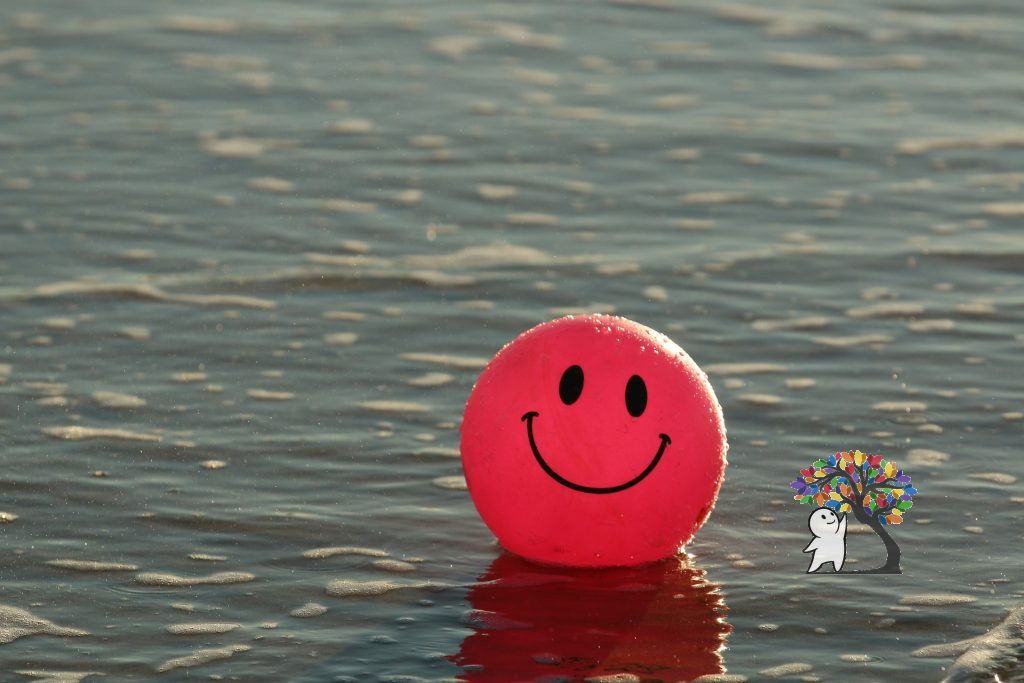


Responses